Invokana (Canagliflozin)











Dosages
Invokana 100 mg
| Quantity | Price per pill | Total price | |
|---|---|---|---|
| 30 | $1.40 | $42.00 | |
| 60 | $1.40 | $84.00 | |
| 90 | $1.40 | $126.00 | |
| 100 | $1.40 | $140.00 |
Payment & Shipping
Your order is securely packed and usually ships within 24 hours. Here's what a typical package looks like.
It is about the size of a regular letter (9.4x4.3x0.3 inches) and shows no details about what is inside.



| Shipping Method | Estimated delivery |
|---|---|
| Express Free for orders over $300.00 | Estimated delivery to the U.S.: 4-7 days |
| Standard Free for orders over $200.00 | Estimated delivery to the U.S.: 14-21 days |









Discount Coupons
- Independence Day - July 4, 2025 10% JULY410
- Labor Day - September 1, 2025 7% LABOR07
- Thanksgiving - November 27, 2025 9% THANKS09
Brand Names
| Manufacturer | Brand Names |
|---|---|
| Johnson & Johnson | - |
FAQ
Description
Diabetes mellitus is directly related to overweight and obesity, which today represent a real epidemic. Therefore, in the first phase of treatment of type 2 diabetes, doctors recommend reconsidering your eating habits and, best of all - following a strict low-carbohydrate diet.
However, this method is not suitable for everyone. After a few months or a couple of years, most patients move on to the second stage of treatment - taking antidiabetic drugs. One of the most modern and promising of these medications is canagliflozin, which is sold under the trade name Invokana.
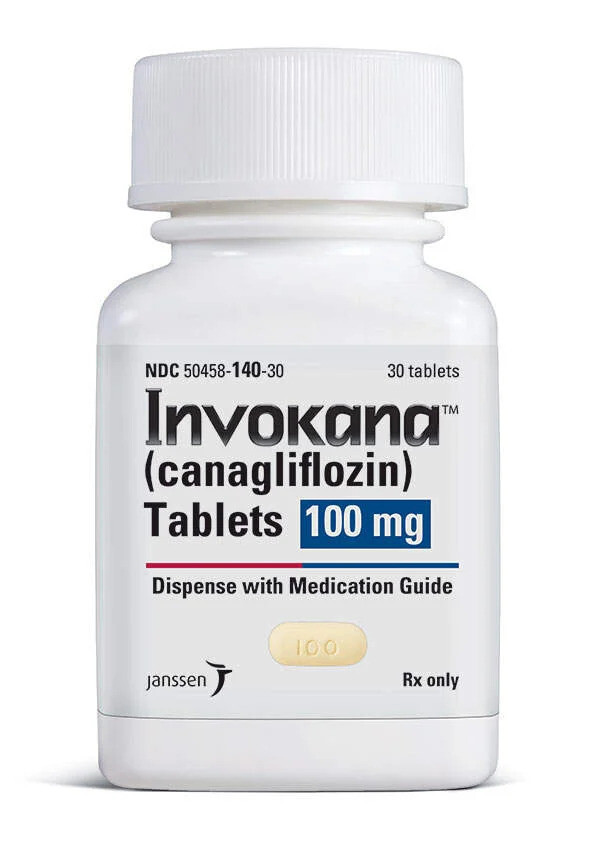
Diabetes mellitus is a severe endocrine disease characterized by a chronic course. Depending on the measures taken and the treatment prescribed, the patient's compliance with a special diet, and all the prescriptions of the attending physician, the pathology can progress slowly or rapidly. The most common type of the disease is type 2 diabetes. Patients have a whole symptom complex caused by a serious violation of metabolic processes. In addition, the disease is dangerous with its consequences. In this case, the most urgent question for patients is what lowers blood sugar.
What Is Invokana Used for
In endocrinology, the disease is divided into 2 varieties:
- Most often, it makes itself known in childhood, so it is also called juvenile. But this is a misnomer since the disease can manifest itself in adults. The pancreas, in this case, produces an insufficient amount of insulin, so patients have to prescribe it in the form of certain drugs. Therefore, this diabetes is called insulin-dependent. It is diagnosed in 10% of cases and is a very rare form of the disease.
- It occurs in 90% of patients and runs with the accompanying so-called metabolic syndrome. It is accompanied by an increase in blood glucose levels and is characterized by insulin resistance. Most patients with type 2 diabetes have a genetic predisposition to the pathology. However, this does not mean that a person without bad heredity cannot have this dangerous disease.
The main task of a doctor when a patient is diagnosed with T2DM is to prescribe medications to help lower blood sugar and prevent the development of complications of the disease. To do this, the diabetic person needs to follow a diet and take medications prescribed by a specialist.
How to reduce blood sugar levels? For this purpose, particular drugs are used, which can be divided into several groups:
- Synthetic drugs. These are potent drugs that help to lower blood sugar and prevent its uncontrolled spikes.
- Herbal medicines. They are available in the form of dry mixtures for making teas. Such remedies serve as a prevention of diabetes or as an additional element in type 2 diabetes treatment.
- Vitamins. They are used in addition to the main therapy. They are necessary for the patient's body weakened by the disease and help to reduce the likelihood of complications.
Signs of Pathology
Symptoms of diabetes mellitus that require examination and the prescription of drugs that reduce blood sugar levels:
- feeling thirsty;
- increased urine output;
- general weakness, increased fatigue;
- poor healing of wounds and injuries;
- weight loss;
- itching of the skin and mucous membranes.
Improper treatment, inadequate selection of diabetes medication, and failure to control blood sugar levels in patients lead to the development of serious complications:
- myocardial infarction;
- stroke;
- impaired visual acuity, up to and including blindness;
- chronic renal failure;
- lesion of the lower extremities (diabetic foot syndrome), etc.
In patients with diabetes mellitus who do not receive proper treatment and have late complications, it was noted:
- decreased ability to work;
- progressive disability.
In extreme cases, in some patients, the disease ends in death. But, on the other hand, if diabetes mellitus is well compensated against the background of intensive therapy and blood sugar is maximally close to normal rates, the occurrence of diabetic complications not only stops for many years but, in some cases, even undergoes reversal.
What Is Invokana
One tablet of Invokana (canagliflozin) medication contains 100 or 300 mg of the substance canagliflozin. This drug is intended to treat type 2 diabetes only; type 1 is a strict contraindication. It is taken only orally in the form of tablets or capsules; the drug is not available in injections.
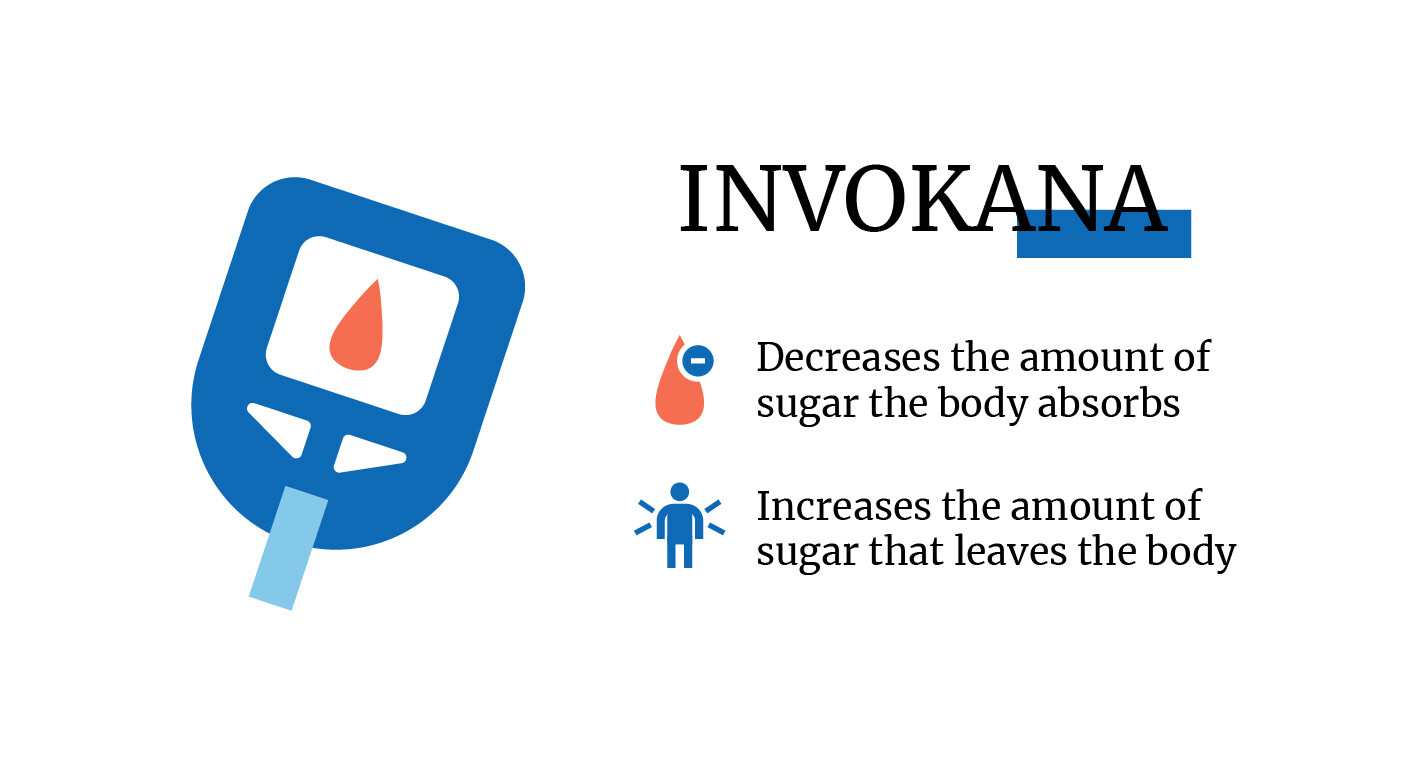
The Invokana mechanism of action is very simple. As a result of clinical studies held in 2022, it has been proved that patients with type 2 diabetes have increased reverse reabsorption (or absorption) of glucose in the renal tubules.
The drug canagliflozin blocks the glucose transporter, which ensures this process, i.e., sugar leaves the bloodstream faster. Thus, the glycemic level and the risk of complications from the target organs - blood vessels, heart, nervous tissue, and kidneys - are reduced. The drug does not affect the disease itself, i.e., it does not eliminate insulin resistance or insulin insensitivity of tissues. Its only task is to remove excess glucose from the blood naturally. However, in clinical trials, canagliflozin has improved pancreatic beta cell function and increased insulin production.
Drug Details
Treating type 2 diabetes is a difficult task that only an endocrinologist can do. The point is that among several groups of drugs, he needs to choose one of the best combinations that is suitable for the particular patient. Canagliflozin is prescribed as monotherapy or in combination with other blood glucose-lowering drugs.
However, therapy will be successful only with an optimal diet and rational exercise because a significant point in the treatment is to reduce body weight in the fight against obesity.
In severe renal failure, canagliflozin is prohibited. Also, to 2022, there is no official permission to prescribe it to patients with severe cardiovascular insufficiency.
Be sure to note that Invokana is a blood glucose-lowering drug intended for oral administration. It has fast action. As a rule, it immediately normalizes the sugar concentration. Thus, it stimulates the production of its hormone by the pancreas. This drug binds on the membrane of p-cells with the protein-receptor specific for this drug.
Subsequently, this leads to the sudden blocking of ATP-dependent potassium channels and depolarization of the cell membrane. This then helps to open the calcium channels. The gradual entry of calcium into the p-cell stimulates the release of insulin.
In people who suffer from an endocrine disorder such as predominantly type 2 diabetes, the insulinotropic response is seen within the first twenty-five minutes of oral administration. This is what guarantees a decrease in plasma glucose content throughout the entire period of food consumption.
What Is Canagliflozin
The active substance canagliflozin, sold under the brand name Invokana, is a selective inhibitor of the sodium-glucose transport protein SGLT2 (Invokana drug class), which removes sugar from the blood, leading to increased urine production, lowering the upper blood pressure index, and weight loss.
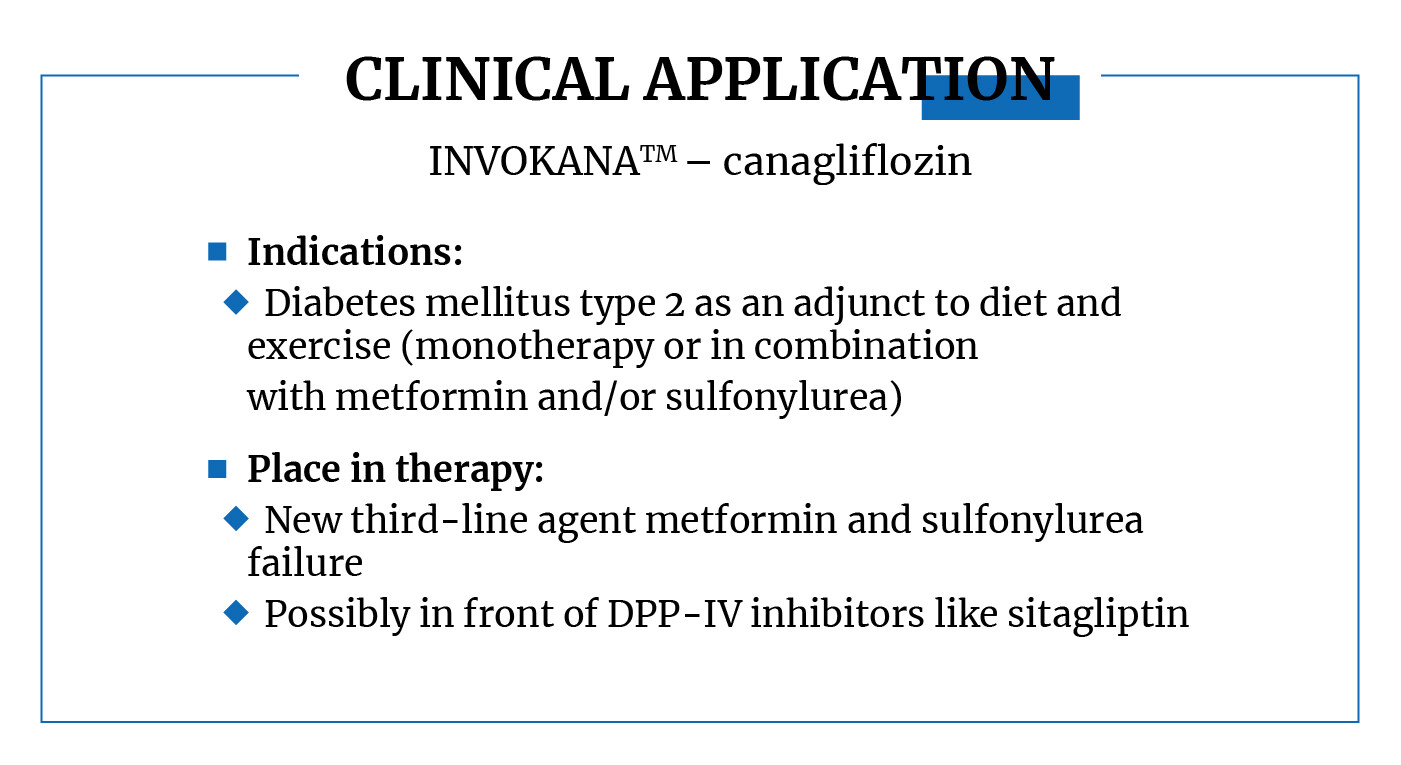
Invokana is used for monotherapy of type 2 diabetic disease when blood glucose is successfully controlled by diet and exercise therapy. Still, reducing the risk of renal failure and cardiovascular disease is necessary due to chronic kidney disease, which involves taking renin-angiotensin system (RAS) blockers.
Invokana is included in the combination therapy of a person with diabetes when he cannot be prescribed metformin or sulfonylurea drugs.
Effects on the body:
- In those taking canagliflozin, the chance of developing renal failure is reduced by 30%; there is a reduction in FFR of ≥ 40%.
- Invokana monotherapy decreases the level of glycated hemoglobin by 0.39 %.
- Compared to sitagliptin and glimepiride, canagliflozin, in combination with metformin, reduces hba1c better by 0.3%.
- After 12 weeks of 100 mg Invokana administration, systolic blood pressure falls steadily by at least 4.28 mg.
- Serum acid decreases significantly, and blood potassium concentrations remain virtually unchanged.
In addition, it was again confirmed that SGLT2 inhibitor drugs do not cause changes in total cholesterol and reduce triglycerides and bad cholesterol - low and very low-density lipoproteins.
In clinical trials, an improved homeostatic model of pancreatic beta-cell function assessment (NOMA -cells) was observed, as well as improved insulin secretion in response to a mixed-food test.
Drug Interactions
Invokana, when used concomitantly, may decrease the absorption rate of oral medications (due to delayed evacuation of gastric contents). Therefore, caution should be exercised when combining therapy with the drug Invokana and the drugs taken orally (especially if rapid absorption of the oral drug is required).
If the patient receives therapy with drugs whose serum levels determine their effectiveness (e.g., contraceptive drugs and antibiotics). In that case, Exenatide should not be taken earlier than one hour after taking such drugs (given the relationship of Invokana with food intake). Invokana decreases peak levels and area under the lovastatin curve and increases the time to peak levels of lovastatin.
No significant changes in lipid profile were observed when combining Exenatide with HMG-CoA reductase inhibitors (compared to HMG-CoA reductase inhibitors monotherapy). Exenatide increases time to peak levels without changing the peak concentration of digoxin, warfarin, and lisinopril when taken in combination (if these drugs are taken 30 minutes after Invokana). There is evidence of increased INR in patients who received Invokana and warfarin concomitantly.
Contraindications, Adverse Reactions
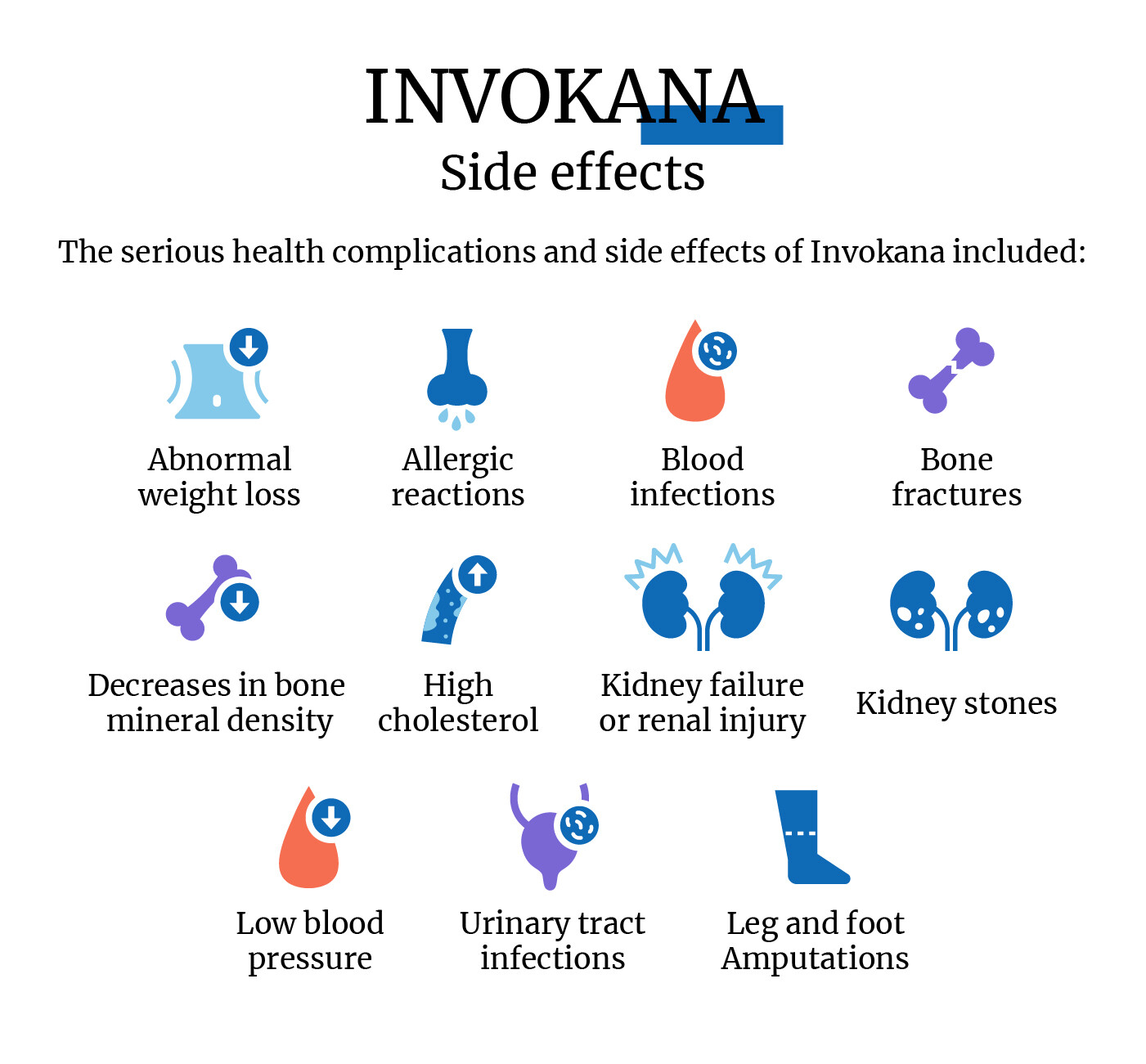
Invokana tablets are not prescribed for the following diseases and conditions:
- type 1 diabetic disease;
- gestational diabetes, lactation period;
- age under 18 years;
- diabetic ketoacidosis;
- chronic heart insufficiency of III-IV degree;
- severe renal insufficiency (glomerular filtration rate<45 ml/min/1.73 m2);
- dialysis;
- "diabetic foot", trophic ulcers;
- treatment with loop diuretics.
The excipients of Invokana tablets contain lactose, so people with diabetes who have lactase intolerance or decreased lactase secretion should not take this drug.
Canagliflozin Side Effects
Invokana side effects:
- A shift of the acid-base balance of the blood to the acidic side - metabolic acidosis.
- Increase in hemoglobin concentration above the upper normal limit.
- Exacerbation of urological and venereal infections.
- Increased fatigue, attacks of dizziness, transient, including orthostatic fainting, confusion of consciousness.
- Dehydration, thirst, severe dry mouth.
- Nausea, vomiting.
- Constipation, exacerbation of pancreatitis.
- Cramps.
- Increased osteoporosis and increased risk of accidental fractures in the elderly.
- Acne, itching of the skin.
In urinary system Invokana may cause increased urine production of more than 3 liters per day, urine leakage immediately and on the sudden urge to urinate, and itching and burning sensation during this process. Although by 2022 numerous studies have proven the fact that this medication is highly effective in patients with type 2 diabetes, trials are still ongoing to this day.
Good news came from England, where scientists confirmed the canagliflozin's cardioprotective and nephroprotective mechanism of action. Researchers continue to look for new indications for which it could be used in addition to the standard and currently only registered type 2 diabetes.
Dosage and Peculiarities of Taking
The therapy with Invokana should start with a shock dose: of 300 mg (3 tablets of 100 mg). After that, for 27 days, there should be a course of taking 1 tablet (100 mg), without reference to food and time of day, but it is better to do it before breakfast. For those with type 2 diabetes who are on insulin therapy, the initial dose of 100 mg can be reduced by half.
Closer to the end of the course, for people with diabetes who are younger than 65 years, the doctor prescribes blood and urine tests, and if the level of glycemic control is insufficient, and the SCF is above 60 ml/min/1.73m2, and creatinine clearance is above 60 ml/min, then it is suggested to switch to 300 mg tablet daily.
The instructions for the drug contain a warning for diabetic people treated with Cholestyramine. They should take an Invokana tablet 60 minutes or 4 to 6 hours after this medication. You should also be aware that during the first 3 months of canagliflozin therapy, you should refrain from driving vehicles and/or work that requires increased concentration.
Alternatives to Invokana
Among the analogs that can replace canagliflozin, dapagliflozin and empagliflozin tablets are available in the United States. In addition, in 2019, new drugs based on a recently tested new active ingredient from the category of SGLT2 inhibitors, ertugliflozin, were approved for sale in the United States. And there are versions of the tablets that contain combinations of metformin and sitagliptin.
NovoNorm
NovoNorm is a drug that belongs to the group of medications with strong hypoglycemic action (sugar-lowering). The composition of this medication includes a substance called repaglinide. The mechanism of action is based on its ability to block ATP-dependent potassium channels, which are placed in the membranes of beta cells. As a result of this process, depolarization of the membrane and opening of calcium channels take place, and the influx of calcium ions into the beta cell is significantly improved, which finally stimulates the secretion of the pancreatic hormone by beta cells.
The drug helps normalize blood sugar, usually due to a short half-life. It is important to note that people can only adhere to a free diet if they take NovoNorm.
NovoNorm is used to treat people with type 2 diabetes (insulin-independent diabetes mellitus) if the expected results regarding blood sugar control with a special diet and sports have not been achieved. Also, complex therapy with the drug in question and metformin or thiazolidinediones is used in those people for whom treatment with any single drug is completely ineffective. Therefore, taking this drug should be started as an additional measure to a proper and balanced diet and sports activities.
Medication Byetta
Byetta medication is administered subcutaneously, and the dosage and cycles of administration are prescribed by a physician and do not require self-adjustment. In most cases, Byetta is initially injected in 5 micrograms twice a day for a month and then, if necessary, the dose can be doubled.
An injection of Byetta may be given at any time of the day, an hour before a meal. If an injection is missed, the next dose should not be doubled. The drug should be cautiously administered to elderly people because the drug may cause an undesirable reaction in the body and lead to complications in elderly patients. During the treatment with Byetta drug, it is necessary to monitor the kidney function and stop the treatment in case of any changes.
Features of Canagliflozin Therapy
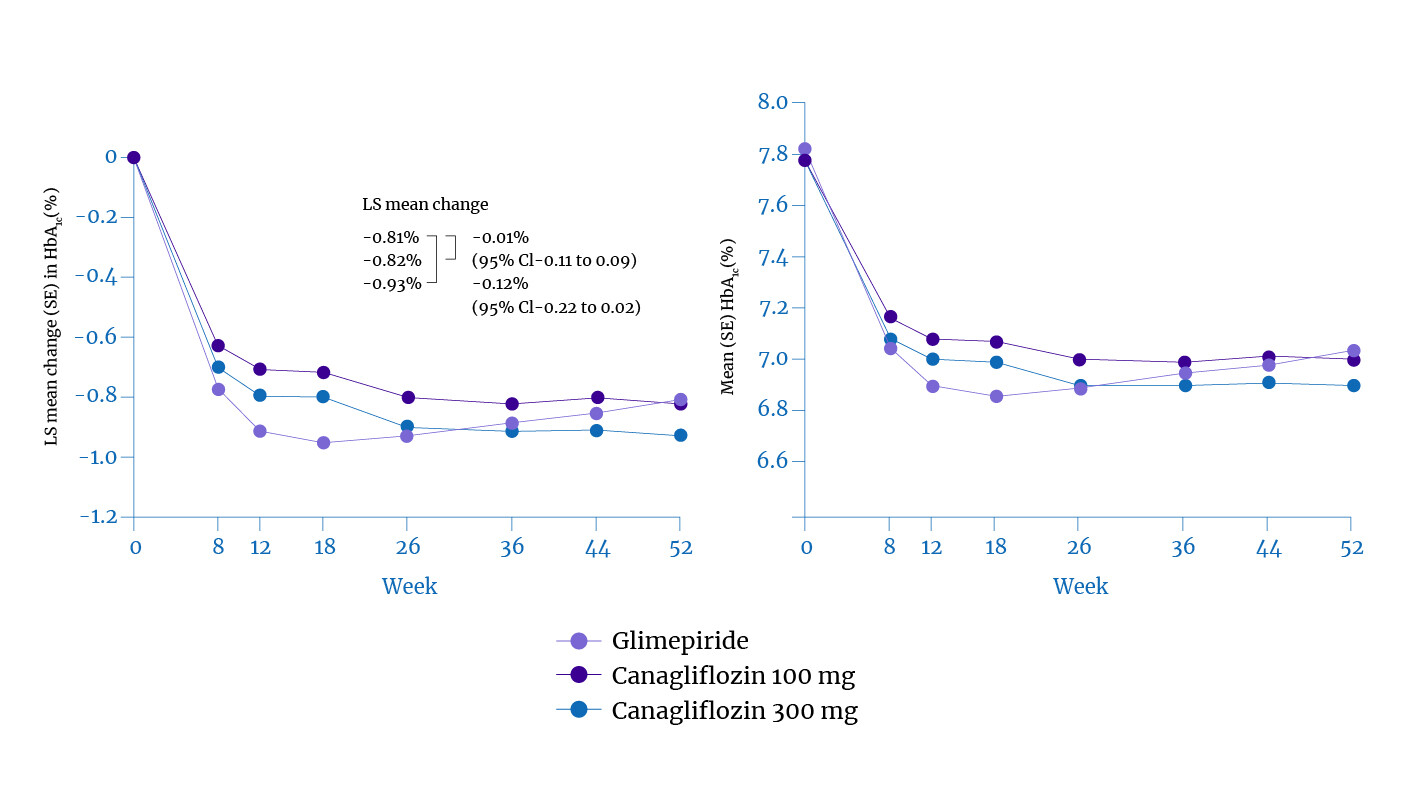
This drug is convenient because you only need to take it once a day. If an increase in urine production occurs, do not worry: this is the mechanism of its action, which is normal. Therefore, doctors do not recommend combining it with other diuretics because if a person does not monitor the amount of fluid intake, he may develop dehydration.
Invokana cost is around $450.
While taking this drug, many people notice an increased appetite. Indeed, a decrease in blood glucose levels makes a person with diabetes feel hungry. The reason for this may be an excessive decrease in blood sugar levels because a high dose (e.g., 300 mg) was prescribed or several antidiabetic drugs were taken simultaneously. Therefore, it is necessary to tell the endocrinologist, and he will adjust the treatment because low sugar levels are more dangerous for people with diabetes than for healthy people.
Frequently Asked Questions
What Is Invokana Used For?
Invokana blocks the glucose transporter, which ensures this process, which means sugar leaves the bloodstream faster. Thus, the level of glycemia and the risk of complications from the target organs - blood vessels, heart, nerve tissue, and kidneys - is reduced.
What Is Invokana?
Invokana is a modern and promising sugar-lowering drug.
What Are the Dangers of Invokana?
What are the dangers of Invokana:
- a shift in the acid-base balance of the blood to the acidic side - metabolic acidosis;
- an increase in hemoglobin concentration above the upper limit of normal;
- exacerbation of urological and venereal infections;
- increased fatigue, attacks of dizziness, transient, including orthostatic fainting, confusion of consciousness;
- dehydration, thirst, severe dry mouth;
- nausea, vomiting;
- constipation, exacerbation of pancreatitis;
- cramps;
- increased osteoporosis and increased risk of accidental fractures in the elderly;
- acne, itching of the skin.
Why Is This Medication Prescribed?
Benefits of Invokana:
- In those taking canagliflozin, the chance of developing kidney failure is reduced by 30%;
- monotherapy lowers glycated hemoglobin levels;
- after 12 weeks of Invokana dosing at 100 mg, systolic blood pressure falls steadily by at least 4.28 mm Hg;
- serum acid decreases significantly, and blood potassium concentrations are virtually unchanged.
How Should This Medicine Be Used?
Invokana is taken once a day. However, your doctor may sometimes change the dosage.












